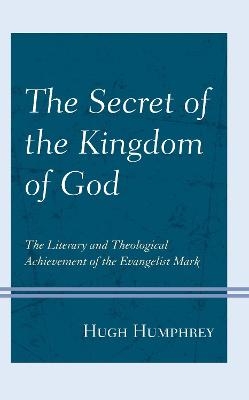
The Secret of the Kingdom of God
The Literary and Theological Achievement of the Evangelist Mark
Seiten
2018
Lexington Books/Fortress Academic (Verlag)
978-1-9787-0264-6 (ISBN)
Lexington Books/Fortress Academic (Verlag)
978-1-9787-0264-6 (ISBN)
This book emphasizes the literary creativity of the Evangelist Mark by detailing his use and imitation of literary materials well-known to him and to his first-century audience. All this was in service of what constitutes the “secret of the Kingdom of God,” that is, authentic Christian discipleship.
The Secret of the Kingdom of God argues that the Evangelist Mark should be recognized as much a creative author as any of the other gospel writers. This new approach examines Mark’s text against the available evidence of the literary heritage of first century authors, their education, and the writing practices in the Greco-Roman world. It is also focused on the text of Mark’s gospel as an intelligible whole, created by Mark using literary models well known to him and to his audience. This “new paradigm” accordingly shows another moment in the developing theology of the early Church, i.e. how a story of the life of Jesus can be used to present the significance of the death of Jesus for his later disciples. Mark is clear about his purpose: His first verse indicates that he will narrate the “beginning” of the “gospel” / “good news” (1:1) of Jesus’ resurrection and he announces the imminent “Kingdom of God” in Jesus’ first words (1:15); the “secret” / “mystery” of the Kingdom of God is then said to be disclosed to those who were his disciples (4:11) and to those who would later be his disciples (8:34 – 9:1). That purpose is clear from the very structure of Mark’s composition, where he discloses the secret of the Kingdom of God in his central section (8:27 – 10:45) and frequently shifts from the narration of Jesus’ story to episodes depicting discipleship. Mark’s gospel, then, is written for Christians to emphasize that they are essentially modelling their lives after Jesus’ life and death and that Jesus’ surrendering of himself to God’s will for him led to Jesus’ resurrection and is the “good news” for us, bringing the hope of our own continuance after death. The Kingdom of God is the reality of all those who live this way in every generation and era. To those “outside” it remains a “secret” or a “mystery” they cannot fathom. To those “inside” it is a place where the love one extends to others brings an intimacy with the Risen Jesus and with the One who sent him (9:37).
The Secret of the Kingdom of God argues that the Evangelist Mark should be recognized as much a creative author as any of the other gospel writers. This new approach examines Mark’s text against the available evidence of the literary heritage of first century authors, their education, and the writing practices in the Greco-Roman world. It is also focused on the text of Mark’s gospel as an intelligible whole, created by Mark using literary models well known to him and to his audience. This “new paradigm” accordingly shows another moment in the developing theology of the early Church, i.e. how a story of the life of Jesus can be used to present the significance of the death of Jesus for his later disciples. Mark is clear about his purpose: His first verse indicates that he will narrate the “beginning” of the “gospel” / “good news” (1:1) of Jesus’ resurrection and he announces the imminent “Kingdom of God” in Jesus’ first words (1:15); the “secret” / “mystery” of the Kingdom of God is then said to be disclosed to those who were his disciples (4:11) and to those who would later be his disciples (8:34 – 9:1). That purpose is clear from the very structure of Mark’s composition, where he discloses the secret of the Kingdom of God in his central section (8:27 – 10:45) and frequently shifts from the narration of Jesus’ story to episodes depicting discipleship. Mark’s gospel, then, is written for Christians to emphasize that they are essentially modelling their lives after Jesus’ life and death and that Jesus’ surrendering of himself to God’s will for him led to Jesus’ resurrection and is the “good news” for us, bringing the hope of our own continuance after death. The Kingdom of God is the reality of all those who live this way in every generation and era. To those “outside” it remains a “secret” or a “mystery” they cannot fathom. To those “inside” it is a place where the love one extends to others brings an intimacy with the Risen Jesus and with the One who sent him (9:37).
Hugh M. Humphrey taught New Testament for fifty years at Fairfield University.
Preface
Introduction: A New Paradigm for Reading Mark’s Gospel?
Chapter 1 The Stages of Composition Evident in Mark’s Text
Chapter 2 The Chreia in Mark
Chapter 3 Mark’s Use of the Wisdom of Solomon
Chapter 4 Mark’s Use of the Elijah/Elisha Material
Chapter 5 Mark’s Use of Homeric Epics?
Chapter 6 Reviewing Other Materials Used by Mark
Chapter 7 Assembling a Summary of Mark’s Creative Work
Chapter 8 The Secret of the Kingdom of God
Epilogue: Appreciating Mark
Appendix
Index
About the Author
| Erscheinungsdatum | 15.03.2019 |
|---|---|
| Sprache | englisch |
| Maße | 160 x 230 mm |
| Gewicht | 467 g |
| Themenwelt | Religion / Theologie ► Christentum ► Kirchengeschichte |
| Religion / Theologie ► Christentum ► Pastoraltheologie | |
| ISBN-10 | 1-9787-0264-7 / 1978702647 |
| ISBN-13 | 978-1-9787-0264-6 / 9781978702646 |
| Zustand | Neuware |
| Haben Sie eine Frage zum Produkt? |
Mehr entdecken
aus dem Bereich
aus dem Bereich
von Athanasius bis Gregor dem Großen
Buch | Softcover (2024)
C.H.Beck (Verlag)
12,00 €
eine Geschichte der christlichen Kunst
Buch | Hardcover (2024)
C.H.Beck (Verlag)
32,00 €


